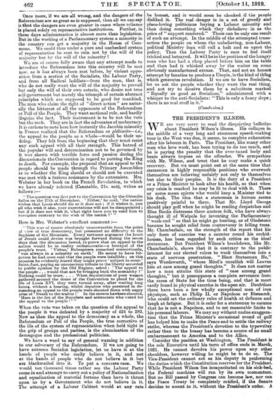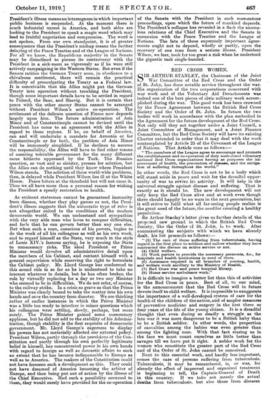THE PRESIDENT'S ILLNESS.
WE are very sorry to read the disquieting bulletins about President Wilson's illness. His collapse in the middle of a very long and strenuous speech-making tour in the West was due, it seems, to complete exhaustion after his labours in Paris. The President, like many other men who love work, has been trying to do too much, and he is paying the penalty that the over-taxed body and brain always impose on the offender. We sympathize with Mr. Wilson, and trust that he may make a quick recovery. But we must point out at the same time that statesmen in highly responsible positions who overwork themselves are behaving unfairly not only to themselves but also to their peoples. It is the duty of a President or a Prime Minister to look after his health, so that when any crisis is reached he may be fit to deal with it. There ar some mean spirits who would keep a Minister tied to his desk. The idea that a .statesman is human seems positively painful to them. That Mr. Lloyd George should play golf when he might be reading despatches and Blue Books distresses these austere folk, who have always thought ill of 'Walpole for inventing the Parliamentary " week-end " so that he might go hunting, or of Gladstone because he sought relief from _controversy in felling trees. Mr. Chamberlain, on the strength of the report that his only form of exercise was a saunter round his orchid- houses, has been regarded by such _critics as the ideal statesman. But President Wilson's breakdown, like Mr. Chamberlain's, shows that it is :contrary to the public interest for our elected rulers to work themselves into a state of nervous prostration. " Blest Statesman He," says Wordsworth, " whose Mind's unselfish will Leaves him at ease among grand thoughts." It does not matter bow a man attains this state of " ease among grand thoughts," but it presupposes a complete severance from the cares of State for the time being, and that is most easily found in physical exercise in the.open.air. Doubtless there have been a few wholly exceptional men of iron physique, such. as Philip IL or Napoleon or Bismarck, who could set the ordinary rules of health at defiance and laugh at fatigue. But it is safer for a.statesman to assume that he is not a Napoleon, and to set reasonable limits to his personal labours. We may say without undue exaggera- tion that the Prime Minister's occasional round of golf has helped him to make the Peace and to settle the railway strike, whereas the President's devotion to the typewriter rather than to the brassy has become a source of no small embarrassment to. Amenca and to the Allies.
Consider the position at. Washington. The President is the sole Executive until his -term of office ends in March, 1921. He cannot devolve his power upon any- other shoulders, however willing he might be to do so. The Vice-President cannot act as his deputy in performing the duties which the Constitution reserves for the President. While President. Wilson lies incapacitated on his sick-bed, the Federal machine will run by its own momentum. But no Bill passed by Congress can become law, nor can the Peace Treaty be completely ratified, if the Senate decides to assent to it. without the President's order. A President's illness means an interregnum in which important public business is suspended. At the moment there is much industrial unrest in America, and both sides are looking to•the President to speak a magic word which may lead to fruitful negotiation and compromise. The word is not spoken. From our own standpoint, it is of greater consequence that the President's mishap means the further delaying of the Peace Treaties and of the League of Nations. For all we know, the Republican majority in the Senate may be disinclined to pursue its controversy with the President in a sick-room as vigorously as if he were still actively campaigning in the Western States. But even if the Senate ratifies the German Treaty soon, in obedience to a chivalrous sentiment, there will remain the practical difficulty of promulgating the Treaty as a Federal law. It is conceivable that the Allies might put the German Treaty into operation without troubling the President, though some important details have to be settled in regard to Poland, the Saar, and Slesvig. But it is certain that peace with the other enemy States cannot be arranged without President Wilson's active co-operation. The settlement of the delicate question of Fiume now depends largely upon him. The future administration of Asia Minor and of Constantinople cannot be devised until the President has come to an agreement with the Allies• in regard to those regions. If he, on behalf of America, can and will undertake a mandate for Armenia or for Constantinople or for both, the problem of Asia Minor will be immensely simplified. If he declines to assume the responsibility, the Allies will have to find other means of assuring tolerable government for the many different races hitherto oppressed by the Turk. The Russian question, so vast and so sinister, presses for solution, but the Allies can do nothing until they know where President Wilson stands. The solution of these world-wide problems, then, is delayed while President Wilson lies ill at the White House. Peace loiters at the threshold but will not cross it. Thus we all have more than a personal reason for wishing the President a speedy restoration to health.
As eminent statesmen cannot be guaranteed immunity from disease, whether they play games or not, the Presi- dent's illness suggests that the autocratic type of ruler is not altogether suited to the conditions of the modern democratic world. We can understand and sympathize with the very able man who loves to conquer difficulties, and feels that he -can govern better than any one else. But when such a man, conscious of his powers, begins to do the work of all his colleagues as well as his own work, and to regard himself as the State, very much in the style of Louis XIV.'s famous saying, he is exposing the- State to unnecessary risks. The ideal President or Prime Minister would devolve all administrative detail upon the members of his. Cabinet, and content himself with a general. supervision while reserving the right to formulate the Cabinet policy. Mr. Lloyd George has conformed to this sound rule in so far as he is understood to take no interest whatever in details, but he has often broken the rule by virtually replacing for a day or two any Minister who seemed to be in difficulties. We do not refer, of course, to the railway strike. In a. crisis so grave as that the Prime Minister was. clearly bound to take the matter into his own hands and save the country from disaster. We are thinking rather of earlier instances in which the Prime Minister was a little too ready to interfere in minor questions which his colleagues were settling, slowly, perhaps, but more surely. The Prime Minister gained some momentary applause, but he did not add to the stability of his Adminis- tration, though stability is the first requisite of democratic government. Mr. Lloyd George's eagerness to display his powers has not materially affected our external policy. President Wilson, partly through the provisions of the Con- stitution and partly through his own perfectly legitimate belief in himself, has concentrated power in his own hands with regard to foreign as well as domestic affairs to such an extent that he has become indispensable to Europe as well as to America. The makers of the Constitution could not have foreseen such a development as this. They could not have dreamed of America becoming the arbiter of Europe, and then being put out of action by the illness of the Chief Executive. Had such a possibility occurred to them, they would surely have provided for the co-operation of the Senate with the President in such momentous proceedings, upon which the future of mankind depends. The President's collapse has revealed in a flash the anoma- lous relations of the Chief Executive• and the Senate in connexion with the Peace Treaties and the League of Nations. The fate of these supremely important agree- ments ought not to depend, wholly or partly, upon the recovery of one man from a serious illness. President Wilson, we fear, took far too great a risk when he undertook the gigantic task single-handed.



































 Previous page
Previous page